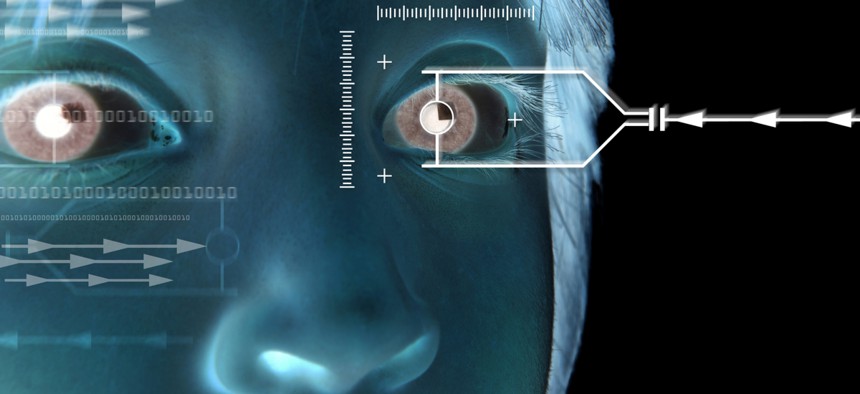More than 5,000 Commenters Weigh in on DHS’ Proposal to Collect More Biometrics from Immigrants

tlorna/Shutterstock.com
Submissions opposing the rule expressed frustration over the abbreviated 30-day comment period.
The Homeland Security Department received more than 5,000 comments on a proposed rule that would expand the scope of its biometric information collection activities related to immigration enforcement.
The rule would allow U.S. Citizenship and Immigration Services to collect more types of biometric information—such as face and iris scans—from more people, including children. The proposal was published in the Federal Register Sept. 11 and the 30-day comment period closed Tuesday.
The thousands of comments included concerns that the rule creates a mass surveillance program without justification and others that voiced frustration over the short length of the comments period. More than 100 organizations joined a letter requesting a minimum of 60 days to comment on the proposal, which is 85 pages long. Sixty days is the typical length of time agencies are supposed to allow for public comment.
Though some commenters simply asked for more clarification around specific provisions, many others from immigration advocacy organizations, technology watchdogs and concerned individuals called the rule a dangerous and unwarranted threat to privacy.
Congressional Hispanic Caucus members submitted a joint letter stating the proposed rule would institutionalize a system that puts immigrants and their families under constant surveillance.
“The rule would make invasive and unnecessary biometrics collection the norm, not the exception,” the CHC letter reads.
The rule proposes expanding the collection of biometric information in several ways. USCIS would be able to collect iris scans, face scans, voice prints and palm prints as well as the results of DNA tests for determining genetic relationships.
The proposal also removes age restrictions, which currently prohibit collection of biometric information from children under the age of 14, and collect information from anyone, including U.S. citizens, involved in the process of filing for an immigration benefit or request.
This information, according to the proposal, would be collected in a wider range of circumstances including background checks, identity verification, enrollment and management, secure document production and “to administer and enforce immigration and naturalization laws.” By the agency’s own count, this would mean an additional 2.17 million new biometric submissions collected annually and a growth in the submitting population from 3.90 million to 6.07 million.
The National Immigrant Justice Center, an advocacy group that provides pro bono legal services to immigrants, refugees and asylum seekers, questioned the premise of the proposal in its comments.
“The real purpose behind this proposal is not security, but an attempt to expand continuous surveillance of immigrant communities while further spreading a hateful and false narrative that immigrants are to be feared,” the NIJC letter reads.
Several commenters emphasized again in their submissions the lack of adequate time given to the public to review the rule in their submissions. NIJC argued the abbreviated comment period “flies in the face of reasonable regulatory practices.”
Futures Without Violence, or FUTURES, is a nonprofit working to end violence against women and children, and it also joined in decrying the shortened comments period. FUTURES also said the rule will deter survivors of abuse from seeking services. The proposal amends how individuals seeking assistance under the Violence Against Women Act and petitioners for trafficking visas, or T visas, prove “good moral character.”
“These provisions are simply unnecessary and unjustified,” FUTURES said in its letter, because self-petitioners under the two laws are already required to submit biometric information in order to be eligible to petition.
“USCIS has completely failed to articulate and demonstrate how the current process of collecting photographs, fingerprints, and signatures is unreliable or burdensome and why a regime of mass biometrics collection is necessary,” the FUTURES letter reads.
Lindsay Harris, director of the Immigration and Human Rights Clinic at the University of the District of Columbia’s law school, told Nextgov the proposal would undermine any sense of belonging for individuals who come to the U.S. Harris works with asylum seekers, many of whom are survivors of torture or trauma.
The rule would delay the family reunification process for asylum seekers, Harris said, adding the process has already become slower during the Trump administration.
“It just lengthens the time that families are separated from one another, and these are people who we have already recognized, who meet our definitions of a refugee, have a valid interest, and need to be here to be safe,” Harris said.
In her comments, Harris noted the effect of the proposed rule on asylum seekers and their family members is similar to the Trump administration’s zero-tolerance policy that led to the mass separation of families at the border. She urged DHS and USCIS to reconsider the proposed rule in order to avoid “repeating this mistake.”
Several commenters also hit on the potential for discrimination in the expansion of biometrics collection. Many referenced the 2019 National Institute of Standards and Technology study demonstrating demographic differences across algorithms used in facial recognition technology. DHS wants to collect face scans in order to use facial recognition systems for USCIS functions.
In its comments, the Center for Democracy and Technology said DHS’s consideration of continuous vetting, which means any non-citizen who received approval for an immigration benefit would have to keep submitting biometric information until they are granted U.S. citizenship, is also discriminatory.
“Continuous vetting raises serious human rights concerns and paves the way for discriminatory surveillance of predominantly people of color,” CDT’s letter reads, calling continuous vetting an unnecessary infringement on privacy rights.
CDT also said the rule proposal provides little information around data privacy. CDT said a recent hacking incident involving facial recognition images collected by Customs and Border Protection raises questions about the federal government’s ability to keep biometric data secure.
“The risk to immigrants is particularly great if sensitive information about them is disclosed to the very government they are fleeing, and a rejected application for relief or an immigration benefit forces their return,” the CDT letter reads.






